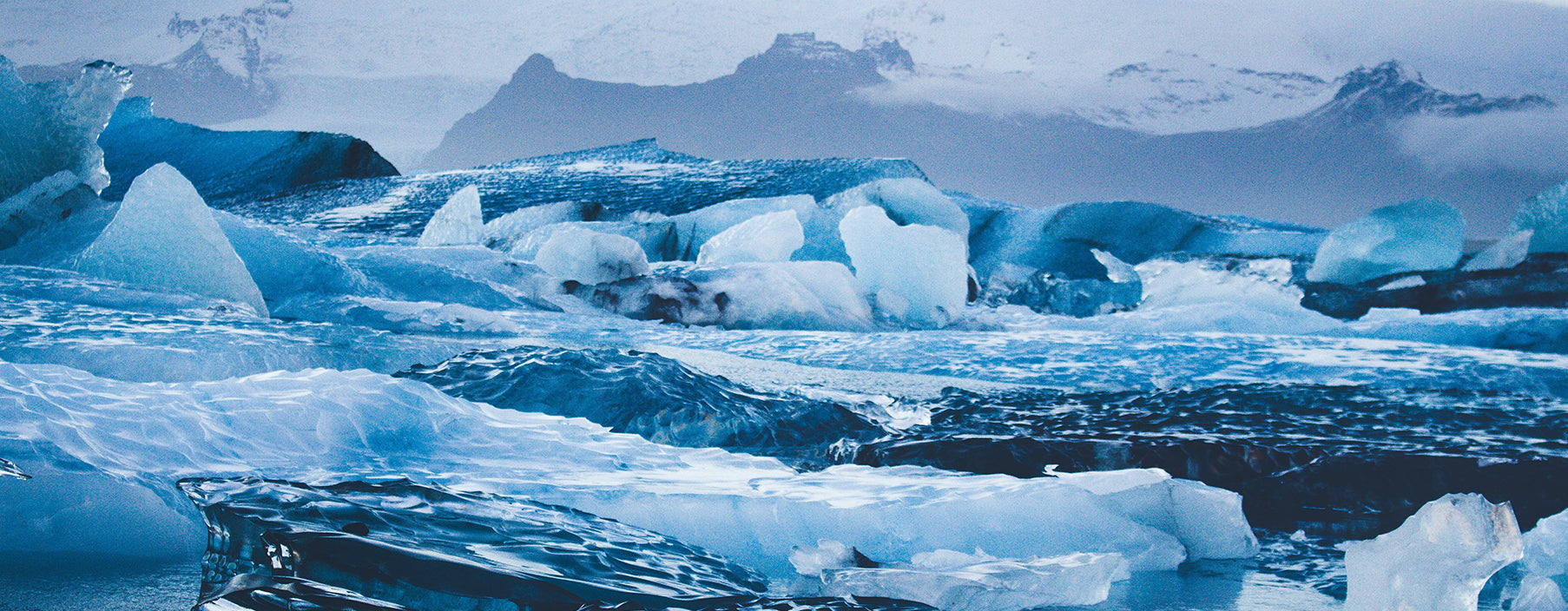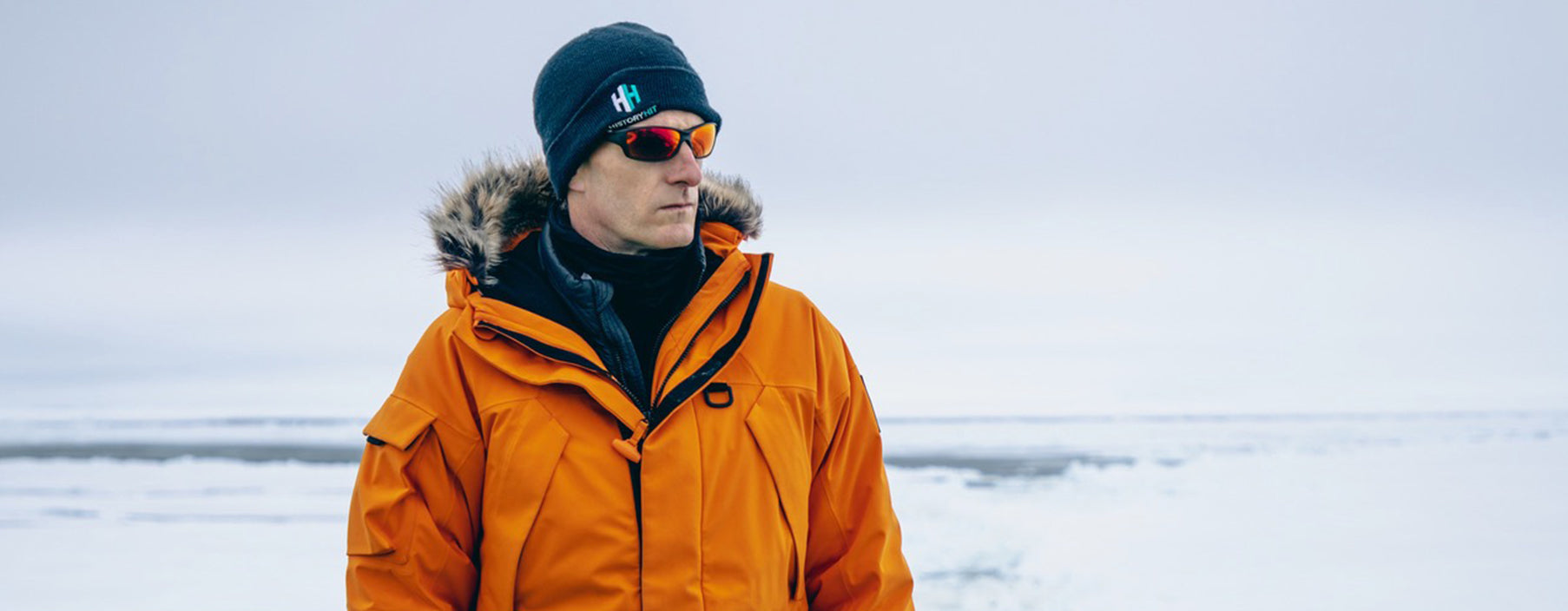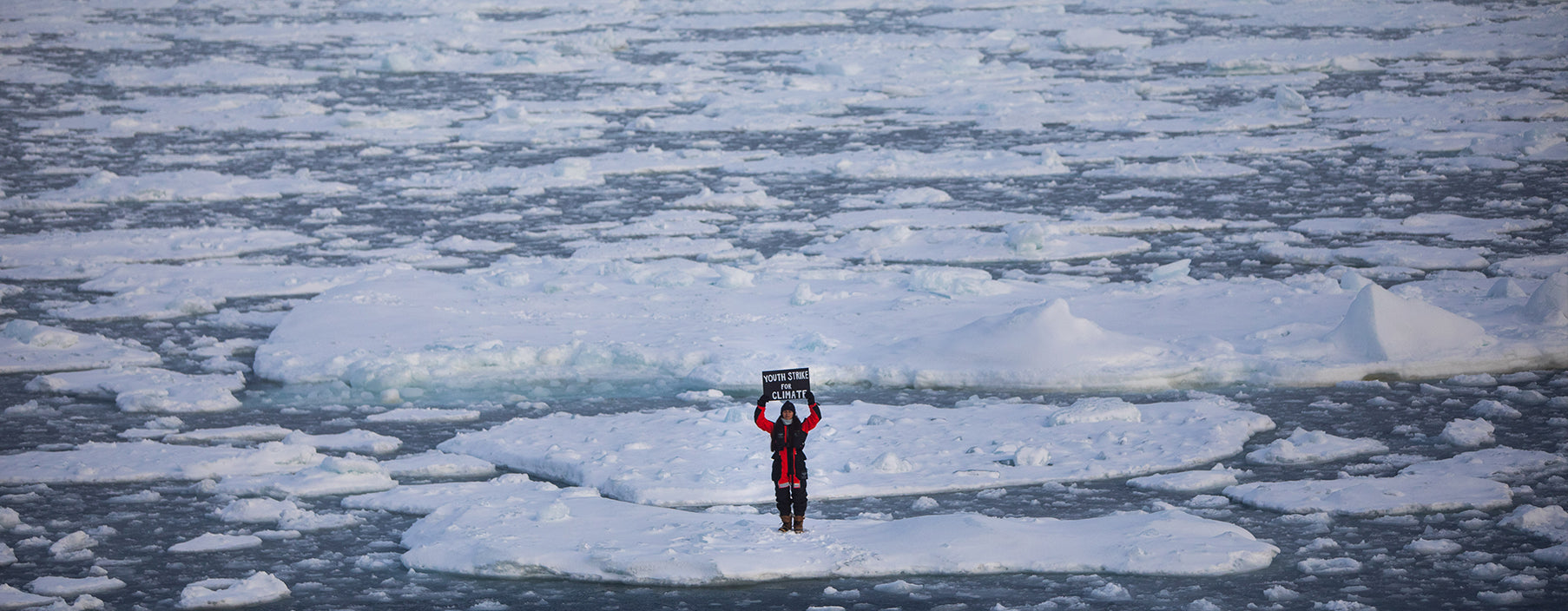
SHACKLETON MEDAL // THE CHAIR OF JUDGES LEWIS DARTNELL
Ahead of the judging for the 2023 Shackleton Medal for the Protection of the Polar Regions, Rachel Halliburton sat down to interview the Chair of Judges, Lewis Dartnell.

THE CHANGING WORLD
In Lewis Dartnell’s last book, Origins: How the Earth Shaped Human History, there were passages that compressed millions of years into just a few sentences. At these moments geology became like a thrilling digital animation, ‘Great chains of volcanoes pop and fizzle,’ he wrote, ‘the ground shivers with earthquakes, and towering mountain ranges crumple out of the ground before being ground away back into dust’. It was published in 2019, the same year in which global warming would cause unprecedented levels of flooding in Argentina and Uruguay, typhoons and storms in countries ranging from India to Japan, and rampant wildfires in California and Australia. So it was fascinating to read in the same book that we live in a geological era defined by ice, ‘There have been between forty and fifty ice ages over the past 2.6 million years’. Currently we’re living in what’s known as an ‘inter-glacial era’ – while global warming is our most pressing threat, it’s only a matter of time before the next ice age engulfs us again.
THE PERILS OF ICE
Most scientists agree, however, that the next ice age will not be for tens of thousands of years, and even that may be delayed by global warming. So is there any hope for the human race to reverse the terrifying climatic trends that we are witnessing? Dartnell is supremely positioned to comment on this. As he prepares to chair the judging panel for the Shackleton Medal for the Protection of the Polar Regions for a second year running, he’s also on the point of bringing a book out that looks at the relationship between biology and human behaviour. Being Human is an intellectual roller coaster ride through the microbial rampages and chemical impulses, the evolutionary compromises and genetic blips that override our consciousness to make us what we are as a species.

Any conversation with Dartnell quickly reveals the machine-gun-fire rapidity of thought and incisive intelligence that has made him a Sunday Times bestselling author twice over. When talking about the global warming crisis it’s normal to think that it was in the industrial revolution that humans broke their contract with the global ecosystem. Yet in Being Human he investigates the much-debated proposition that maybe it was with agriculture that the rot set in. At one point he cites Jared Diamond’s observation that ‘The invention of agriculture in several independent locations around the world roughly ten millennia ago…[was]…the worst mistake in human history’.
LIVING WITH LIVESTOCK
‘‘Agriculture intensified our relationship to nature,’ Dartnell declares when we meet for coffee at Duke’s Hotel in St James’s to discuss logistics for the second Shackleton Medal. ‘Rather than living in the wild and hunting, we were bringing particular animals into very close association with us. Through farming we were effectively bringing them into our own homes to give them shelter and protection. And that provided the opportunity for animal diseases to jump the species barrier into humans.’

So we got the common cold from the horse, chicken pox from, well, chickens, TB from cattle, and – most surprisingly – leprosy from mice. I put it to him that agriculture also started to tilt the balance in carbon emissions – even though the impact was not nearly as dramatic as with industrialisation – since inevitably with farming comes deforestation. Dartnell concurs, talking about the impact of the invention of the axe, and the chopping down of trees especially in northern Europe to put our crops in the soil. Beyond this he discusses how paddy fields for growing rice in South East Asia, precisely because they needed to be flooded, ‘became anaerobic on the bottom and quite major sources of methane. So that’s another aspect of how the agricultural revolution could have impacted on the atmosphere.’
PACT WITH THE FUTURE
Far from being a straightforward attack on farming, this is much more an acknowledgement of the Promethean pact humanity seems to make every time it advances. Farming – as Dartnell points out in his book - also brought with it the concept of wealth, the ability to create cities, the possibility of larger families, and, indeed, literacy. Sustaining civilisation is ultimately about balance. One of the huge positives of human advance has been the move away from a culture dominated by the alpha male – who demonstrates what he describes as ‘reactive aggression’. Far more successful has been what Dartnell identifies as ‘proactive aggression’, in other words a ‘calculated, premeditated action towards a specific goal’. He writes that, ‘An individual’s influence within society became decoupled from their personal physical prowess, and instead came to rest on the strength of their social network and the reputation they had gained based on their generosity or supportiveness’.

I challenge him that we haven’t altogether moved away from alpha-male culture – that the dominance in recent years of politicians like Trump, Bolsonaro and, of course, Putin has demonstrated the potency of old-fashioned reactive aggression. It seems no coincidence that their short-term vision has come hand in hand with a disregard for the environment. He agrees that while as a species we have moved away from reactive violence, ‘The rates of physical aggression among other primates – even the more peaceful bonobos – are more than a hundred times higher than among humans,’ we also see significant flip sides. Though, he reassures me, the fact that democracy is the most common form of government in the world shows that ‘persuasion’ or proactive aggression remains the dominant force.
CHAOS THEORY
One of the most striking aspects of the book is that tiny shifts in human behaviour can have a huge impact – just as a butterfly flapping its wings can cause a storm in the Atlantic. Dartnell makes several brilliant connections between disparate historic events, but one of the best concerns lemons, and the fact that by 1799 the British Navy had realised that they were the superfood that could prevent the life-threatening condition of scurvy for sailors. ‘Before the introduction of lemon juice rations,’ he writes, ‘a ship could operate for only ten weeks before being overrun by scurvy. But after 1799, the Royal Navy was able to keep its squadrons and fleets at sea for four months without resupply of fresh provisions.’

The result? Well, for a start, Nelson’s victory at the Battle of Trafalgar. And also, erm, the Mafia. How so? ‘[F]rom 1803, Nelson turned Sicily into a giant lemon juice factory to supply antiscorbutics for the Royal Navy worldwide…The surge in demand for lemons driven by naval procurement created a commodity boom and injected a huge influx of cash into this [constitutionally] unstable situation, greatly exacerbating the problems. It is out of this lawless landscape that the mafia emerged. The combination of high lemon prices, high levels of local rural poverty and a weak rule of law meant the owners of citrus orchards were extremely vulnerable to scrumping. Hundreds of pieces of fruit – representing a huge value on the market – could be stolen off the branches in a single night.’
TURNING THE TIDE

Yet another example, then, of how what seems like progress can have both positive and negative consequences. Returning to the subject of climate change Dartnell says, ‘It’s the unintended consequence of a previous solution to a problem that society was facing – in that it was running out of energy. We realised we had access to fossil fuels, which seemed like a godsend, but in fact this solution was like dealing with a genie who seems to grant your wish. There’s always a twist. And we are currently facing the consequences. Yet we have the kind of intelligence that means that while the problem was created by us, hopefully, we'll be able to solve it as well. This doesn’t just mean technological change but also sociological change – things like taking a train on holiday rather than flying, really taking responsibility at an individual level.’
Small behavioural changes, in other words, that can make a significant and positive difference. Shortly after chairing the first Shackleton panel, Dartnell and his wife had a baby – something that must have affected his perspective on what the future holds. ‘Certainly it focuses your mind,’ he says, ‘We’re already seeing the severe consequences of climate change – temperature records are being broken all the time. This is not something that’s happening far away from us, it’s affecting each and every one of us even in the developed world. And as a parent – as for all parents – it’s becoming ever more clear that this challenge is not just about what happens in your lifetime but about what you’re going to pass on – about being better stewards for the planet. We need fundamentally to change our relationship with the world around us.’
SHACKLETON MEDAL
Find out more about the 2023 Shackleton Medal for the Protection of the Polar Regions, the judging panel and the previous winner, Dr Heidi Sevestre HERE.
Find out more about the 2023 Shackleton Medal for the Protection of the Polar Regions HERE.


